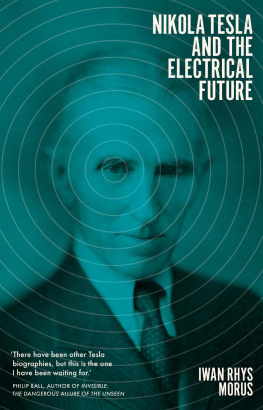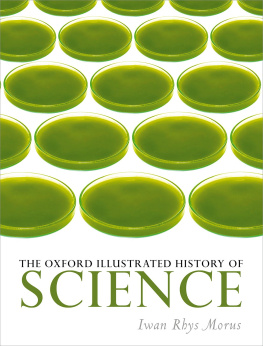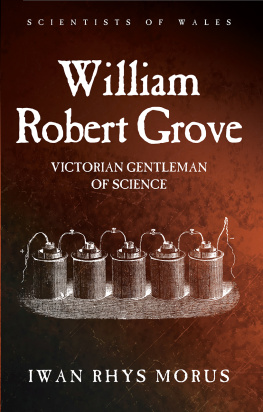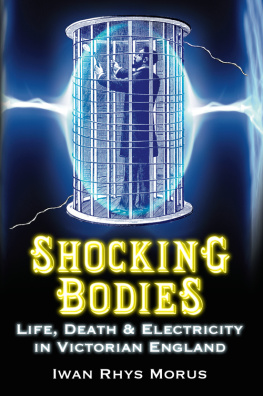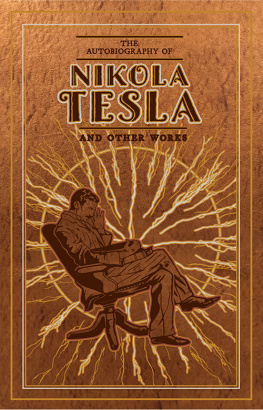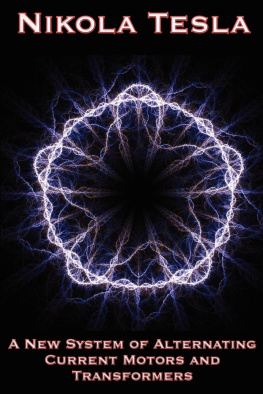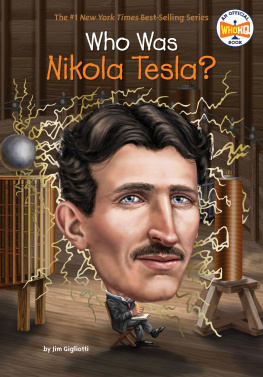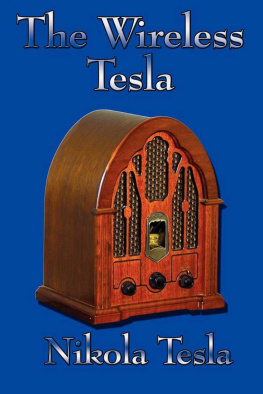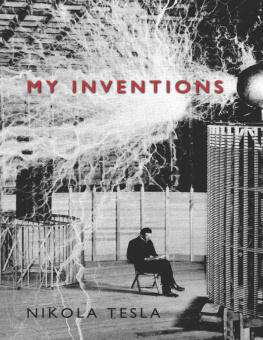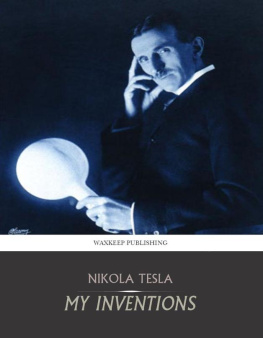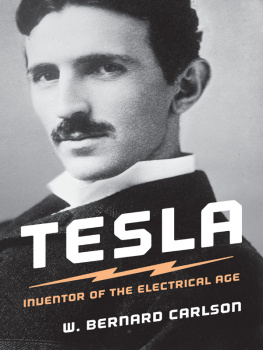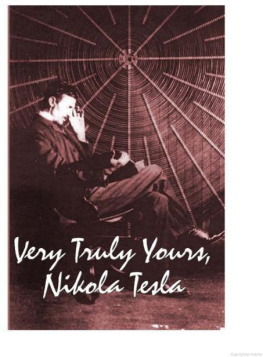There have been other Tesla biographies, but this is the one I have been waiting for. Neither hagiographic nor hatchet-job, it sets its mercurial subject in his cultural and historical context: a visionary and showman, part genius and part crank, totally a product of his age. Tesla cannot be understood without a clear view of the (uniquely American) legend he embedded himself within, and Iwan Rhys Morus expounds that view brilliantly. Tesla, he shows us, was like his one-time boss and rival Thomas Edison inventing nothing less than the electrified future.
Philip Ball, author of Invisible: The Dangerous Allure of the Unseen
Nikola Tesla saw himself as a rebel, a free-thinker, a disruptor and the sworn enemy of scientific mediocrity. Brilliant in his experimentation, chaotic in his methodology, Tesla was the twentieth centurys first visionary tech entrepreneur.
Thomas Dolby, musician and sound tech pioneer
Contents
N ikola Tesla is in many ways one of the most enigmatic, curious, and controversial figures in the history of science. He was controversial during his own lifetime too, with opinion divided between those who thought he was either a visionary, a charlatan, or a fool. Whatever he was, he was full of apparent contradiction. Tesla was a consummate showman and a very private recluse a man of science who seemed to be addicted to self-promotion and sensationalism. He was a prolific inventor of technologies that sometimes helped make other mens fortunes, but failed completely to make one for himself. Tesla embodied the aspirations and the paradoxes of an age of innovation that seemed to have the future firmly in its grasp. Looking back now at the future that Tesla imagined, it still seems very familiar. It is no coincidence that Elon Musk named the company making his electrical car of the future Tesla. Teslas fin-de-sicle invocation of an electrical future still casts its shadow over the ways we understand our future now.
The final decades of the nineteenth century and the opening decade of the twentieth century were a time of unprecedented technological transformation. Tesla was one of the key innovators of that innovative age. He was a key figure in developing new ways of generating and transmitting electrical power. He played a vital role in establishing the networks of power that still run our economies more than a century later. The last quarter of the nineteenth century saw the global spread of the telegraph network, the invention of the telephone, and the beginnings of wireless telegraphy. The discovery of X-rays and radioactivity seemed to open up new vistas for the future. The beginning of the twentieth century saw the beginnings of powered flight. This was the world that produced Tesla, and that he helped produce. His restless speculations and experiments about the way tomorrow would be also helped inaugurate new ways of trying to understand the future the ways we still turn to as we try to make sense of the future now, and imagine how to get there.
Tesla is often described (and some of his promoters described him in this way during his own lifetime) as a man ahead of his time. It is a relatively common way of talking about great innovators Leonardo da Vinci is another example of someone often talked about in this way. In Teslas case, however, the suggestion could not be more wrong. He was in all ways the product of the scientific and technological turmoil of those final decades of the nineteenth century during which the future seemed to be coming closer on an almost daily basis. That is why this book will not be just a biography of Nikola Tesla. It will take the inventor as its guide and follow him through the cut-throat entrepreneurial culture of late Victorian and Edwardian electrical invention. I want to explore the electrical future that Tesla saw himself creating, and the raw materials from which that future was being forged.
The decades during which Tesla completed his education, came to America and made himself as an inventor were characterized by a near-addiction to innovation. Both the Old World that Tesla left, and the New World where he lived for most of his adult life were undergoing rapid technological change. Electricity was no longer just a thing of lecture theatres and exhibitions, but was leaking everywhere into everyday life. Cityscapes and townscapes across Europe and America were now festooned with the paraphernalia of electrical technology. Cables criss-crossed the sky, carrying power to homes and businesses, or buzzing with information from telegraphs and telephones. Electric tramcars trundled down the streets. At night, public buildings and shopfronts dazzled the eye with spectacular displays of electric lighting. To many people, it looked as if tomorrows world had already arrived, and people like Tesla were the ones who had delivered it.
This was a time when engineers and inventors could be heroes. They were held up and celebrated as examples of what discipline and perseverance could achieve. As we shall see, even on the far frontiers of the Austro-Hungarian Empire it was possible for a young man like Tesla to dream of a life of invention. Invention offered a road to fame and fortune. More importantly, it seemed to offer an opportunity to change the world. The prevailing image of invention and inventors was one of determined individualism. Tesla, of course, fashioned himself carefully to fit that image, as did others like Thomas Edison. To be an inventor Tesla had to be a showman too. Electricity seemed made for spectacle and Tesla turned himself into a consummate performer of electrical spectacle. He quite literally made himself part of the display, making it seem as if he held the electrical future in his hands.
Electricity and invention at the beginning of the twentieth century were bound up with imagining the future. The nineteenth century was in many ways the century that saw the invention of the future. The nineteenth-century future was imagined as a place that would be different from the present and generated by technological progress and innovation. This was particularly the case with electricity. Electricity was understood as the stuff from which the future would be made, to such a degree that it was almost impossible to discuss electricity at all without invoking its future. To most people, electricity simply was instantaneous communication, with or without wires; new sources of power; locomotion; improved agriculture and control of the weather; weapons and flying machines and electrically generated health. This was a future extrapolated from bits and pieces of present technology. One of the things that made Tesla so successful was that he was very good at offering compelling images of the future his inventions would deliver.
The stories that Tesla told about the future of wireless communication and wireless power that he was trying to build at Wardenclyffe during the first few years of the twentieth century were very much part of a wider culture of speculating about the future both in fact and in fiction. The magazines and newspapers that reported on Teslas activities and relayed the visions of the future that he promised were filled with such stuff. They published scientific romances by the likes of H.G. Wells as well and sometimes the scientific romance and the scientific facts were hard to disentangle. It was no coincidence that Teslas speculations about wireless communication with Mars, for example, were aired at the same time as everyone was reading The War of the Worlds. Telling tales about the future was integral to the business of invention. Inventors like Tesla needed to excite the publics imagination to sell them their vision of the future and to attract the attention of the money men whose cash would be needed to make those visions real.
One of the reasons, I think, why Tesla remains such a fascinating and seductive figure is that the image of invention he wrapped around himself remains a very familiar one. That image which Tesla helped create of the inventor as an exceptional kind of individual is still the way we tend to think about inventors and innovation today. Just as people in the nineteenth century associated invention with individuals, so do we. Where they made Brunel, or Edison, or Tesla into heroes, we do the same with their contemporary equivalents though maybe we are a little more inclined than our great-grandparents to make them villains instead. Whether we think of them as heroes or as villains though, the image of invention that we have inherited from the nineteenth century is one that portrays innovation as something that is produced through the exertions and talents of remarkable individuals. Teslas self-portrait as the uniquely gifted, asocial, daydreaming obsessive is one that still resonates for us today.

